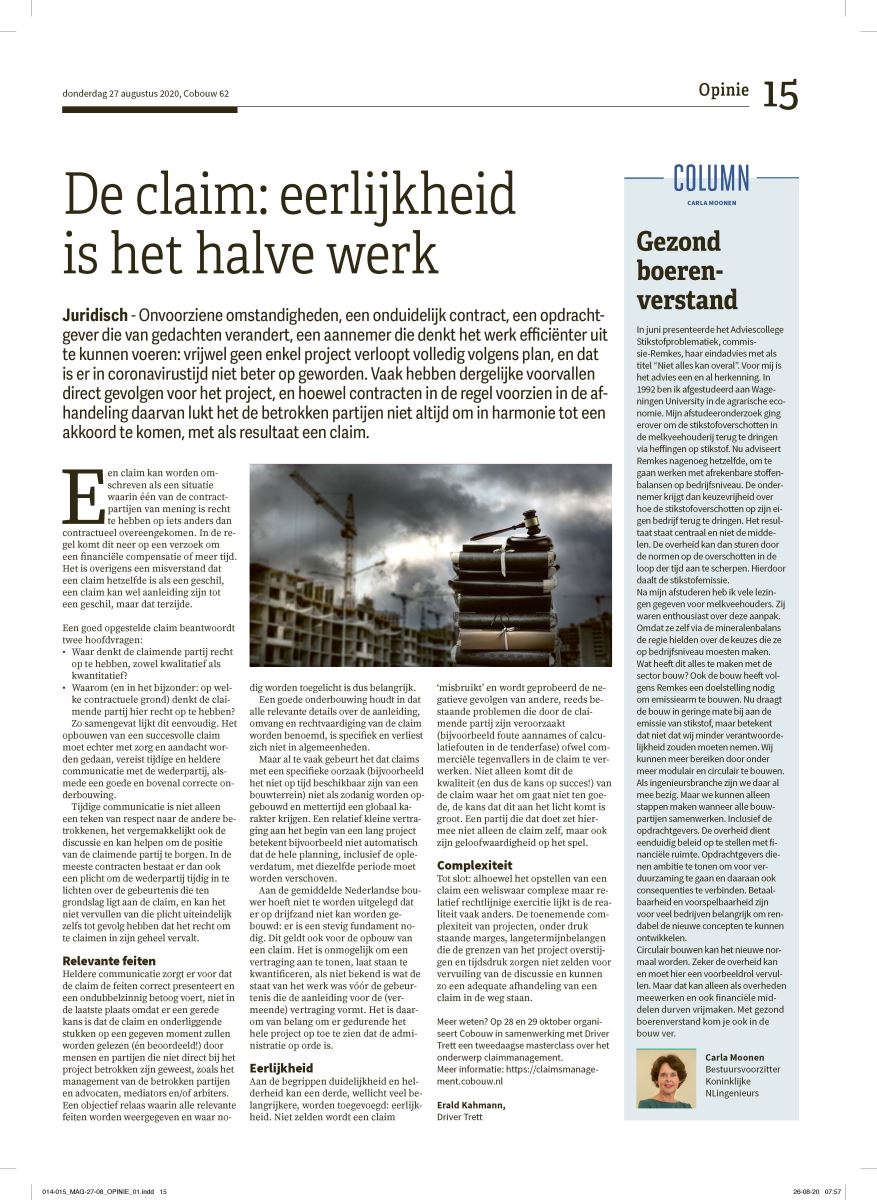Senior Consultant for Driver Trett Netherlands, Erald Kahmann, discusses some basic principles about the preparation and management of a claim.
The article originally featured in the August 27th, 2020 publication by Cobouw.

Click the image to read and download the Dutch article.
On October 28th - 29th, 2020, Driver Trett are co-hosting a Claims Management Masterclass in partnership with Cobouw, where Managing Director for the Netherlands, Hugo Frans Bol, will be one of the key speakers.
For more information and to register for the masterclass, visit: https://claimsmanagement.cobouw.nl/
Read on for the English translation.
Unforeseen circumstances, unclarities in the contract, a client changing their mind, a contractor who thinks they can execute the work more efficiently: almost no project is carried out exactly to the original plan - and that has not improved under the current coronavirus circumstances.
Often, changing events carry direct consequences for the project, and even though most forms of contract contain mechanisms for dealing with such events, the parties involved do not always reach an agreement, ending in a claim situation.
A claim can be described as a situation in which one of the parties to a contract is of the opinion to be entitled to something different than what was originally agreed in the contract. In most cases, this comes down to a request for additional payments or an extension of time for completion. Claims are often confused with disputes, although a claim may – and often does – lead to a dispute.
A well-prepared claim answers two main questions:
- What is it the claimant considers to be entitled to (both qualitative and quantitative)?
- Why (especially, on what contractual grounds) does the claimant consider itself entitled to that?
Summarised like this, it seems simple. Preparation of a successful claim is however something that needs to be done with care and attention, requires timely and open communication with the counterparty as well as a full and correct substantiation.
Timely communication is not only a sign of respect to the other party, it may also make the discussion easier and may aid in securing the claimant’s contractual position. It is not surprising that most forms of contract therefore require a party to a contract to, within a certain period, inform the counterparty of an event or occurrence that may impact the project, and not meeting this requirement can eventually lead to losing the right to claim anything at all.
Relevant facts
The claim should represent the facts clearly and correctly, and in precise language that is not open to interpretation. Not least because there is reasonable chance the claim and its attachments could be read (and judged!) at a later stage, by persons and parties that were not directly involved in the project (or at all). These could be from anyone, such as the parties’ senior management, lawyers, mediators, and/or arbitrators, or judges. This makes it important to prepare an objective argument in which all relevant facts are brought forward, and clarified when necessary.
Proper substantiation means that it contains all relevant facts about the cause, extent, and justification of a claim, and ensures the claim is specific to those subjects without getting lost in generalities or overly broad statements.
It would not be the first time that a claim with a specific cause (e.g. late availability of a building site) is not brought forward in the same specific way, but becomes generalised as it develops. A minor delay at the beginning of a project, as mentioned in the example, does not necessarily mean that the entire project programme will have to shift by that same period.
One does not have to explain to an experienced contractor that a proper foundation is required for a solid result. The same goes for the preparation of a claim; it is impossible to demonstrate a delay, let alone quantify it, if the exact status of the work before the event or occurrence that caused the (alleged) delay is not known. It is therefore of the utmost importance to ensure the project administration is properly kept throughout the entire project.
Honesty
In addition to clarity and completeness, a third (and maybe even more important) element is required for a well-prepared claim: Honesty. It is not uncommon for claims to be ‘misused’ by parties who may, in an effort to alleviate the negative effects of other problems (e.g. wrong assumptions, estimating errors in the tender phase or delays caused by themselves), try to include such commercial setbacks in a claim. Not only does this counteract the quality of the claim, the chance that the slight of hand will be discovered, is significant, and if found out, such claimant may not only lose the claim, but also its credibility.
Final thought
While the preparation of a claim seems to be a complex, yet relatively straight-forward exercise, reality often adds additional challenges. The increasing complexity of projects, tight schedules, fierce competition resulting in ‘fighting’ contract prices and long-term interests exceeding the boundaries of the project, often pollute the discussion and can interfere with the process of adequately dealing with a claim.